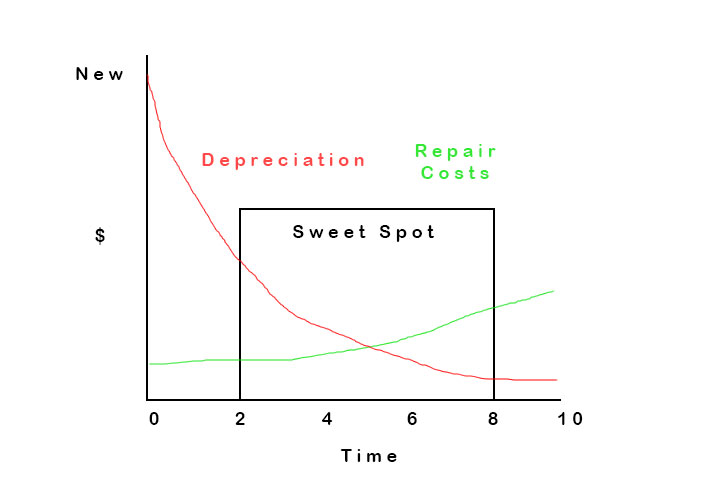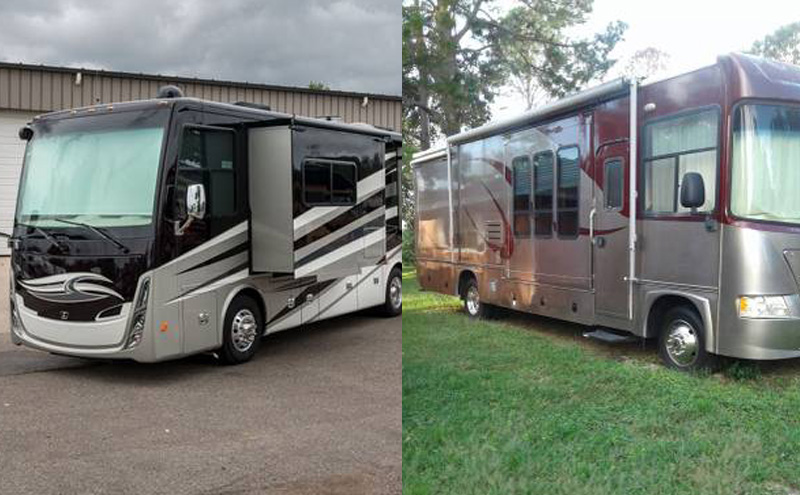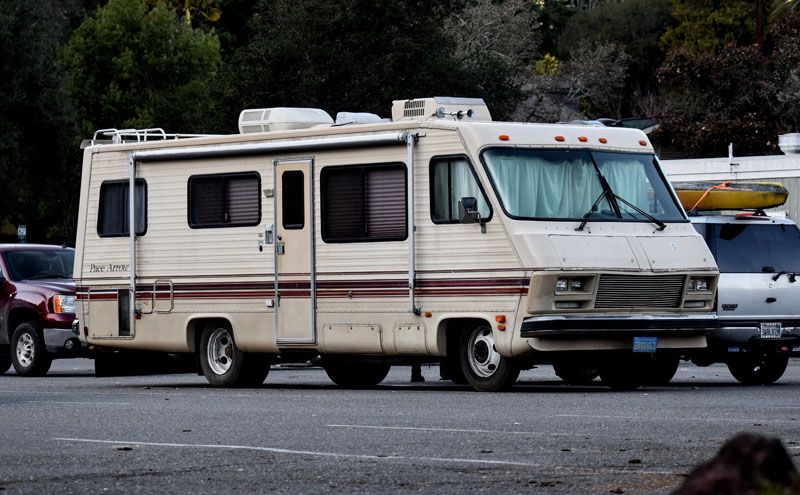Which is the better choice? A new or a used RV? Through this post you'll learn that buying a used RV makes the most financial sense. RV depreciation tends to match a very similar trend to how cars depreciate as shown in the graph below:

You'll find that most RV depreciation happens in the first couple of years.
Then it evens out with higher repair costs and lower depreciation as the RV ages.
In other words you will lose most of your money on an RV's value in the first few years, and as the years progress you'll have less and less depreciation.
On the flip side with buying a new RV you will have very little repair costs, or if any in the first few years.
The following RV depreciation chart shows the average value over time based upon NADA and Kelly Blue Book:
Year | Depreciation | Value |
|---|---|---|
1 | 18% | $65,600 |
2 | 10% | $57,600 |
3 | 7% | $52,000 |
4 | 6% | $47,200 |
5 | 6% | $47,200 |
6 | 5% | $38,400 |
7 | 5% | $34,400 |
8 | 4% | $31,200 |
9 | 4% | $28,000 |
10 | 3% | $25,600 |
New Vs Used RV: What should you buy?

Should you buy new and face the heavy depreciation in the beginning, but have very little repair costs?
Or...
Should you buy a used RV after the heavy depreciation has occurred and risk the repair cost?
The answer is to buy within what we call the "sweet spot".
This sweet spot lies between 2 to 8 years for the age of the RV. It's what I consider the best financial choice to own an RV.
With this scenario you're going to have the best possibility of getting an RV for the best price, with the least amount of maintenance during your ownership.
If you look for one that's around that 5 year mark, with medium usage, you'll get the best overall value. The reason you don't want an RV with little to no usage is that it could mean the owner was not checking it on a regular basis for small issues.
Like with a car, routine maintenance is key. It's even more important since most people only use RVs for part of the year during peak season.
Is it ever worth it to buy a new RV?
Most people buy a new RV because there is very little risk involved, and hesitate to look for a used one.
The best financial move though is to buy a high quality used RV. You'll be able to get the best bang for your buck within this range.
To clarify I do not think it's terrible to buy a new RV. However, the decision has to be for reasons other than the financial aspect. If you have been saving up for a long time and want that experience of getting a new RV that's okay too.
Many people want to get an RV that matches exact to what they want. They're willing to sacrifice depreciation for it to feel clean, fresh, and new.
If you've got money to blow, there's nothing wrong with that go right ahead. Not everything has to be a financial decision.
New RV Pros & Cons
PROS
CONS
Used RV Pros & Cons
PROS
CONS
How do you determine what an RV is worth?
For the valuation of an RV, it's actually tied more to the age and how it was kept, and less based upon the mileage. Mileage only plays a small role in the depreciation for an RV since most have problems other than the driving aspect.
These problems could range from insulation, smell, leakage, cracks, and a whole host of other issues. Be sure to do a full inspection before you buy any RV.
What about the different RV types?
When looking at the depreciation of Class A, Class C, and Class B motor homes, travel trailers, or fifth wheels... they all seem to depreciate at almost identical rates.
Based on many RV salesmen, the Class C motor homes do sell faster than the Class As due to their lower price point.
Some higher end fifth wheels also tend to depreciate a little bit faster.
The Bottom Line - Don't Get Ripped Off
An RV is a depreciating asset or liability any way you look at it. It's very similar to a car. Over time it will only drain money from your pocket as you have to maintain it. Unless of course you're talking about a classic RV that may reach the point of appreciation and could be considered an investment.
Over 80% of people end up paying WAY more than what the RV is even worth (new or used). As long as you hunt for a good deal and do your research, you should be able to find a good value for your money.
For most that money is well spent with the vacations and experiences that come along with camping in an RV.

